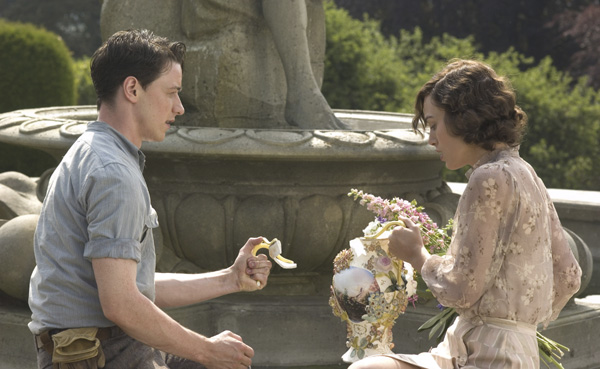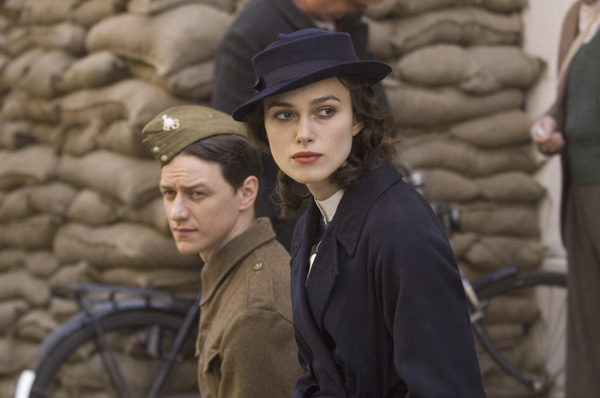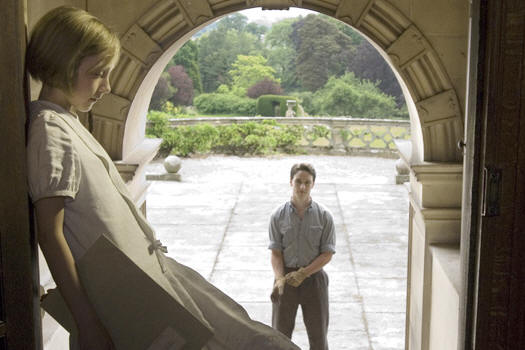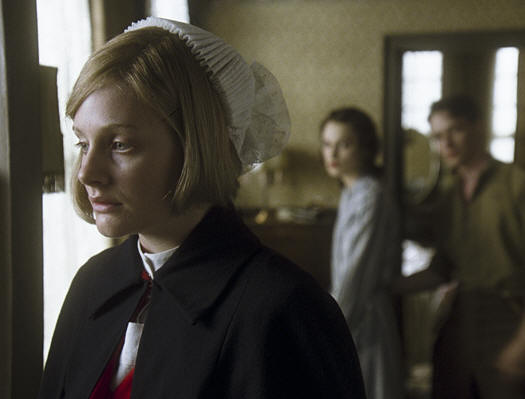Copyright ©2007 PopEntertainment.com. All rights reserved.
Posted:
December 7, 2007.
When adapting a complex novel like Ian McEwan’s best-seller Atonement,
it was important to find a screenwriter who could do justice to the epic
scope and passions on the pages of the book. It made sense to give the job
to a writer who has specialized in adaptations, someone who could understand
the structure and intricacy of the source material. The man chosen for the
monumental task was Christopher Hampton.
Hampton, whose career has spanned decades in film and on stage, first made a
real name for himself by bringing the classic French play Les Liaisons
Dangereuse to the screen as Dangerous Liaisons with Glenn Close,
John Malkovich and Uma Thurman. Since then Hampton wrote screenplays of
classic tales such as A Doll’s House, The Good Father and The
Quiet American. Hampton has also directed three films: Carrington,
The Secret Agent and Imagining Argentina.
On the stage, Hampton also wrote the book for Andrew Lloyd Webber’s smash
musical Sunset Boulevard as well as Uncle Vanya, Hedda Gabler
and Don Juan.
However, Atonement may be his most layered and assured work yet. A
sprawling, beautiful look at how one little girl’s lie can destroy three
lives; Atonement goes from mid-30s opulence to World War II horror in
London and France. A star-crossed couple (James McAvoy and Keira Knightley)
are torn apart when her little sister (played at different points in her
life by Saiorse Ronan, Romola Garai and Vanessa Redgrave) tells a lie which
sends the man to jail and then war.
“Christopher Hampton did such a great job of throwing the characters in and
out and about,” said star McAvoy, appreciatively about the final script.
A
week before the premiere of Atonement, Hampton sat down with us at
the Regency Hotel in New York to discuss the process of adapting such a
beloved piece of literature.
 How
did you set about adapting the novel
Atonement?
How
did you set about adapting the novel
Atonement?
Well, it’s a long story, actually. I applied for the job, because I read the
book while I was on holiday at the end of 2001. I thought there was real
potential there. If you did right it could be really a good movie. So when I
got back to London, I contacted my agent and said I would love to do a
screenplay of Atonement. She said, “Well, join the group.” There were
a lot of writers interested in
doing it. Ian McEwan made
it in his contract – he was executive producer – he had retained the right
to be consulted on who they choose as the screenwriter. So I had dinner with
Ian and set out my feelings about the book – the way it should be done. I
passed the audition. What I said to him, what I was intending to do, didn’t
actually bear much resemblance to what we wound up with at the far end.
That’s the way it goes when you work on something and you get deeper and
deeper into it. I started with a different director; I started with Richard
Eyre (Notes on a Scandal). I worked with him for just over a year; I
think and did maybe three drafts, consulting at each point, on each draft
with Ian.
At
the end of that period we had the script with sort of a framing device,
which began with the old woman arriving back at a hotel, which her childhood
home had been turned into. You saw her from time to time in the course of
the film. You heard her voiceover reflecting on this, that or the other. In
the book – if you know – it’s in three really big chunks. What I’d done was
I kept the first half pretty much as you see it now, but the Dunkirk
sequences and the hospital sequences, which happened at the same time. I had
combined them – cut back and forth between them. We saw Briony learning to
be a nurse and we saw Robbie Turner in France fighting his way back to
[Cecilia]. Anyway, at a certain point one of those things happened, which
often happens with films, where you think they’re not going to make it.
They’re scared of this picture. There’s a silence that’s been going on for
just that bit too long. At which point Richard Eyre was offered Notes on
a Scandal, and off he went. So I got introduced to Joe Wright, who said,
“Well, yeah the script is fine, but can we start from scratch?” (laughs)
What was it like
working with Joe compared to Richard?
 It
was different mostly in that their approach was very different. What Joe
basically did was he set about kicking away the crutches. He said “Let’s try
and do it without a frame, so the audience at the end of the film is as
surprised as the readers are at the end of the book.” He said, “Let’s take
away the voiceover, try and convey everything without that particular help.
And let’s try not
to worry about the linearity of the story. Let’s get back to those three big
chunks.” Another thing that he did was… I don’t know whether we might have
arrived at this anyway, but he certainly raised the idea… when we started we
were thinking we were going to have to have one actress playing Briony at
twelve and Briony at eighteen. So we were thinking maybe we
would get a
fifteen-year-old actress who could age down and age up. That was the first
thing that came into everyone’s head. As we were working on it and putting
it back into those blocks, we sort of realized that with the Dunkirk block
there would be like twenty minutes between seeing the child and seeing the
eighteen year old. That would probably make it much easier for us to cast
two actresses. That was probably the single biggest decision that we made,
because to have that child – leave alone the fact that she’s a good actress,
Saoirse, in parts she’s brilliant – to have that child in the first half of
the story really, really explained the story in a way that wouldn’t have
been explained by an older actress pretending to be a twelve year old, I
don’t think. I can’t see how it would work.
It
was different mostly in that their approach was very different. What Joe
basically did was he set about kicking away the crutches. He said “Let’s try
and do it without a frame, so the audience at the end of the film is as
surprised as the readers are at the end of the book.” He said, “Let’s take
away the voiceover, try and convey everything without that particular help.
And let’s try not
to worry about the linearity of the story. Let’s get back to those three big
chunks.” Another thing that he did was… I don’t know whether we might have
arrived at this anyway, but he certainly raised the idea… when we started we
were thinking we were going to have to have one actress playing Briony at
twelve and Briony at eighteen. So we were thinking maybe we
would get a
fifteen-year-old actress who could age down and age up. That was the first
thing that came into everyone’s head. As we were working on it and putting
it back into those blocks, we sort of realized that with the Dunkirk block
there would be like twenty minutes between seeing the child and seeing the
eighteen year old. That would probably make it much easier for us to cast
two actresses. That was probably the single biggest decision that we made,
because to have that child – leave alone the fact that she’s a good actress,
Saoirse, in parts she’s brilliant – to have that child in the first half of
the story really, really explained the story in a way that wouldn’t have
been explained by an older actress pretending to be a twelve year old, I
don’t think. I can’t see how it would work.
So
we did all those things and more, really. Eventually after another year of
various tasks for Joe, Joe and I went away to Italy for two weeks and just
went through every single page. He’s very obsessive, Joe. Most of the really
good directors I’ve worked with are completely obsessive. Right up until
shooting he was ringing me up saying, “On page 80…” He emailed me his
rewrites of scenes, saying, “This is not right. Something like this….” Then
I would try and work out what it was he wanted and write it and email it
back again. Or I would say, no, this is not a good idea. We had a good
enough relationship to do that.
The Dunkirk sequence, was it in the script as one long, five-minute take?
No,
it was not. In fact what we did was we were faithful to the book in that
sequence too. If you read the book, you’ll know that it’s all about these
huge colonies of refugees. The enormity of France being attacked by German
fighter planes, strafed. It’s a ragged conflict between the retreating
soldiers and the advancing Germans. We had all that. We had all those things
in the script, and there was a budget problem. They wanted to make the film
for $30 million. They insisted on it, because they felt all along that it
was a risky venture. So, that was the obvious section to start weeding out.
Eventually, we thought we could make a virtue of this… by just having these
three soldiers, sort of like The Wizard of Oz or something, in some
phantasmagorical way walking up through these landscapes, and then suddenly
arriving at this teeming hell.
As
we got closer to it, Joe said, “Can we take all these various scenes, these
montage images that we have, and do them all in one shot? And then only have
to have the extras, a thousand extras, for one day.” And so it was. It was
pretty nerve-racking, because we rehearsing at six o’clock in the morning…
this was highly weather dependent. We started shooting at four in the
afternoon, and we got three takes done, the third of which was at magic
hour, you know when the sun is shedding these beautiful lights. Then we went
back for a fourth take, in the middle of which the Steadicam operator fell
over. (laughs) I mean, the guy had been walking backwards carrying
this vast thing through the sand all day, so it’s not surprising. The third
take as it turns out was the only one that was workable.
 Can
you talk about working with
a storyline with two
protagonists and an antagonist who becomes our protagonist toward the end?
Can
you talk about working with
a storyline with two
protagonists and an antagonist who becomes our protagonist toward the end?
Well, in a way, the sleight of hand that we operated is that the book is
about Briony. She is the central characters and the backbone of the whole
book. We somehow felt that we have to shift the focus. We’d have to make the
film about what Briony was interested in, rather than only about Briony.
Briony was obviously interested and obsessed with these two. As a child,
being in love with this man, all of that was very interesting. We needed to
spend some time with those two characters [Robbie and Cecilia] together, and
we needed to admit to ourselves that their relationship was the center of
the film. We just kind of danced around those problems as best we could.
It sounds like
as a writer you had more involvement on the set than most get a chance to
experience.
It
really in the end comes down to the relationship between the writer and the
director. Sometimes, I’ve had very good relationships with directors.
Stephen Frears, as I’ve said, has in his contract that the writer had to be
on the set. But, Joe’s not like that. We cut off, and I didn’t go to the set
much. I went on Dunkirk day. And because I speak French I went and did work
on the French language sections. I put my head around the door once or
twice. But, he had it clear by the time he embarked on it. He knew what he
wanted and he didn’t need the writer. It all depends on the individual
director and what their temperament is, really.
 Did
you see Vanessa Redgrave as the actress for Briony as an older woman? It’s a
welcome surprise when she shows up.
Did
you see Vanessa Redgrave as the actress for Briony as an older woman? It’s a
welcome surprise when she shows up.
He
did a very smart thing, Joe. This is really good thinking for a director. He
cast the child first. Most people would be tempted to cast the eighteen-year
old first. He cast the child first, and then he had to find two actresses
who would plausibly be the grown-up versions of the child. Vanessa was
always on this quite a short list of those distinguished old English
actresses. I think
Vanessa is the one who
can most reliably be expected to break your heart. There’s something tragic
about her face that works terribly well. And she did sort of look like [Saoirse].
Joe rehearsed the three actresses together a lot, so that they all devised
ways of walking and mannerisms and so on that linked them. That spread from
one section to another.
I’ve heard a rumor that you’re doing the adaptation of Jonathan
Strange and Mr. Norrell.
I’m
not doing that anymore. I started out on that, but I slightly fell out with
them on the topic that I often fall out with, which is that they seemed to
want to go too far away from the book for my tastes.
What attracts you to
the sweep and complexity of stories like that?
Oh,
I love doing the big crossword puzzle. (laughs) You know, all
screenwriters get fired from time to time, and I have been five or six
times. And it almost always has to do with an issue of my saying “You know
this is not how it is in the book. Why do you want to change it? The change
you’re proposing is not as interesting as what the book is proposing.” You
never know. It’s a long process. You might end up going back. I have also in
the past had experiences where they say goodbye to you and then they come up
and ask you to come back again. It was a really interesting piece of work to
do, so I don’t regret it. But it’s in the hands of someone else now.
Email
us Let us know what you
think.
Features
Return to the features page.